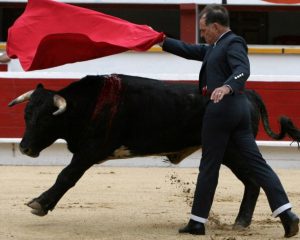Peter Rombold’s 45 Year Odyssey in the land of El Toro
By Mark Schwarz

“…and it was destiny”, says San Diegan Peter Rombold, for years considered among the top aficionados prácticos (amateur bullfighters) in North America, if not the taurine world. Now 67, Rombold’s distinctive profile is no less recognizable than in the glory days and he himself is more convinced than ever that an apparently serendipitous journey with his older brother and father to Tijuana in the late 50´s was anything less than fate.
“I don’t know exactly what it was,” he says, brown eyes searching back through the innocent gaze of the fourteen year old he was at the time, “it was information overload. But, Monday morning, I was in the Chula Vista library, checking out books.”
As often happens, one chance encounter spills over into another; water through unseen pathways. “Jim Fergus, editor of “Toros” magazine, put me in touch with Manolo Urrutia in Mexico City, and off I went—at 18—to be a matador.” That adventure lasted only two months, and a “broke and homesick” Rombold never again seriously pursued professional designs, but the “gusano—the worm” had lodged itself very cozily inside the athletic young San Diegan’s gut.
Rombold trained with local novillero Ruben Corrales, whom he’d met through the Club Taurine de Chula Vista, which in turn led to 65 festivals or semi-professional appearances in over four decades of activity—including “3 or 4 “formal” novilladas “ (corridas for aspiring professionals) dressed in the ornate “traje de luces”—suit of lights worn by matadors.
Rombold has rich memories of travels and travails alike, “no punctures” he is relieved to point out, “but, I got the shit kicked out of me several times,” and a progressively more noticeable limp from a torn meniscus in the era before arthroscopic surgery, “the revenge of the bulls” he rues—not unhappily. He pardoned the lives of two of his opponents, cut several tails (the highest recognition for participants), and fought a bull of the famous Domeq ranch in Spain, probably the high point of his Quixotic quests.
Along the way there were characters, superstitions (no hats on beds—EVER; a cigarette before every entrance paseillo (Rombold is otherwise a non-smoker), a swig of brandy, sexual abstention two weeks before a performance (“got to have your legs”)—and the acknowledgement—somewhat coyly, that it was “…great to be an American bullfighter — even an amateur.”
For him, at least it was never about braver, “I never thought I was brave, or “macho”, although he recognizes that there are amateurs, apprentices, and professionals alike whose stock in trade is a fire-breathing, eat-‘em-alive brand of sensationalism and that toreo can be served as a heaping plate of cojones.
“I was intrigued by the technique, the know-how, reading the bull.” He demonstrates, extending his hand toward the imaginary animal and precisely, mill metrically “touching” the outside horn to provoke the charge. “It’s in the voice, the stance—I was told to stand still, so I did—and it worked, but it wasn’t bravery, exactly.”
Rombold understands that many will never agree with, let alone comprehend, his strange passion.
“It’s cultural, and this is America, they’re in their right, but these animals would probably not exist if not for the corrida…maybe in zoos,… but, the bull is a warrior and the corrida reveals that in a way that nothing else could…” Welling with emotion at the thought of the bull’s physical beauty and desire to fight, Rombold draws a curios modern parallel that—in ways unique to el toreo, somehow demonstrate its staying power: “The Klingons believed that a dead body was just a shell—that the honor was to have fought and died as a warrior.” He believes that the Fiesta will last—somewhat diminished—”as long as there is money to be made”, then he pauses and collects his thoughts, “as long as people are interested in the emotions, the feeling as the bull passes you” the peculiar emotions produced by, to quote Hemingway, “a man, a bull, and a small length of cloth.”
He thinks he’d like to write a book about his life, “Between Bulls” is his working title—”I’d just tell all the stories, the festivals, the tientas, the people—and a little of the other,” the stuff between the bulls, where this mature Gringo has happily spent the last 45 years of his unusual life.